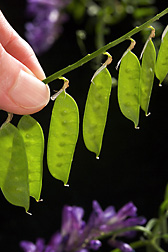This page has been archived and is being provided for reference purposes only. The page is no longer being updated, and therefore, links on the page may be invalid.
|
Read the magazine story to find out more. |
|
|
|
|
Early-Flowering, Winter-Hardy Hairy Vetch Released for Northern United States
By Don Comis
April 17, 2008
Agricultural Research Service (ARS) geneticist and breeder Thomas Devine and collaborators have released "Purple Bounty," the first winter-hardy, early-flowering vetch for the northern United States.
Until now, hairy vetch--a cover crop and weed-suppressing mulch favored particularly by organic farmers--had limited use north of Maryland because it copes poorly with northern winters. But Purple Bounty has survived winters as far north as upstate New York.
Devine, with the ARS Sustainable Agricultural Systems Laboratory in Beltsville, Md., spent nine years breeding this variety. He used traditional breeding methods so that the variety would be acceptable to organic farmers. He started with several hairy vetch types from Auburn University in Auburn, Ala., and from the U.S. National Plant Germplasm System, then maintained in Georgia. There he found early-flowering types.
From these, Devine selected for improved winter hardiness while maintaining early flowering. He harvested seed from plants that survived winters at Beltsville and at the University of Maryland farm at Keedysville in northern Maryland. Purple Bounty emerged from nine cycles of selection, with the right blend of winterhardiness and early flowering.
It flowers two weeks earlier than a commonly used variety. This allows farmers to plant their main crop earlier in spring and use corn and tomato varieties that require a longer growing season.
Limited quantities of seed should be available for planting in 2008, with commercial quantities available in 2009.
Devine's collaborators on the release of Purple Bounty included the Rodale Institute near Kutztown, Penn.; the Cornell University Agricultural Experiment Station at Ithaca, N.Y.; and the Pennsylvania Agricultural Experiment Station at University Park.
Read more about the research in the April 2008 issue of Agricultural Research magazine.
ARS is the U.S. Department of Agriculture's chief scientific research agency.

